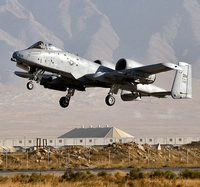On Monday, USA Today reported that the United States Air Force was increasing the size of its Afghanistan contingent in order to keep up with the dramatic expansion in the rate of airstrikes since Gen. David Petraeus took over command of the war effort.
To some, the fact that Petraeus -- the American military figure most associated with FM 3-24 (.pdf), also known as the counterinsurgency (COIN) manual -- is responsible for increasing the use of airpower in Aghanistan represents a paradox. FM 3-24 takes a notably dim view of airstrikes, suggesting that they "can cause collateral damage that turns people against the host-nation government and provides insurgents with a major propaganda victory. Even when justified under the law of war, bombings that result in civilian casualties can bring media coverage that works to the insurgents' benefit." Soldiers with rifles, it is implied, are better at protecting civilians than fighter jets with bombs.
To be sure, to suggest that COIN is all about building houses and making friends is a poor caricature of the actual military tasks involved in a counterinsurgency campaign. Winning the acquiescence of the local population depends less on directly meeting their needs than on supplying security, which often requires "kinetic" action against insurgents. Thus, even "population-centric" COIN requires bombing people.

